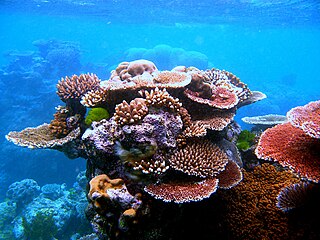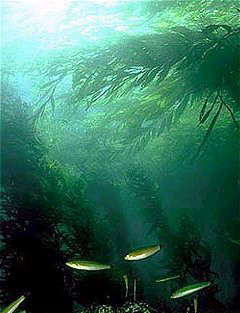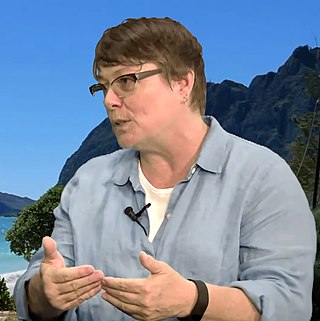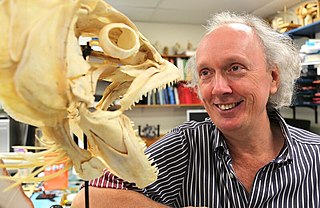
Corals are colonial marine invertebrates within the class Anthozoa of the phylum Cnidaria. They typically form compact colonies of many identical individual polyps. Coral species include the important reef builders that inhabit tropical oceans and secrete calcium carbonate to form a hard skeleton.

A coral reef is an underwater ecosystem characterized by reef-building corals. Reefs are formed of colonies of coral polyps held together by calcium carbonate. Most coral reefs are built from stony corals, whose polyps cluster in groups.

Coral bleaching is the process when corals become white due to loss of symbiotic algae and photosynthetic pigments. This loss of pigment can be caused by various stressors, such as changes in temperature, light, or nutrients. Bleaching occurs when coral polyps expel the zooxanthellae that live inside their tissue, causing the coral to turn white. The zooxanthellae are photosynthetic, and as the water temperature rises, they begin to produce reactive oxygen species. This is toxic to the coral, so the coral expels the zooxanthellae. Since the zooxanthellae produce the majority of coral colouration, the coral tissue becomes transparent, revealing the coral skeleton made of calcium carbonate. Most bleached corals appear bright white, but some are blue, yellow, or pink due to pigment proteins in the coral.

Kelp forests are underwater areas with a high density of kelp, which covers a large part of the world's coastlines. Smaller areas of anchored kelp are called kelp beds. They are recognized as one of the most productive and dynamic ecosystems on Earth. Although algal kelp forest combined with coral reefs only cover 0.1% of Earth's total surface, they account for 0.9% of global primary productivity. Kelp forests occur worldwide throughout temperate and polar coastal oceans. In 2007, kelp forests were also discovered in tropical waters near Ecuador.
Regime shifts are large, abrupt, persistent changes in the structure and function of ecosystems, the climate, financial systems or other complex systems. A regime is a characteristic behaviour of a system which is maintained by mutually reinforced processes or feedbacks. Regimes are considered persistent relative to the time period over which the shift occurs. The change of regimes, or the shift, usually occurs when a smooth change in an internal process (feedback) or a single disturbance triggers a completely different system behavior. Although such non-linear changes have been widely studied in different disciplines ranging from atoms to climate dynamics, regime shifts have gained importance in ecology because they can substantially affect the flow of ecosystem services that societies rely upon, such as provision of food, clean water or climate regulation. Moreover, regime shift occurrence is expected to increase as human influence on the planet increases – the Anthropocene – including current trends on human induced climate change and biodiversity loss. When regime shifts are associated with a critical or bifurcation point, they may also be referred to as critical transitions.

The Great Barrier Reef is the world's largest reef systems, stretching along the East coast of Australia from the northern tip down at Cape York to the town of Bundaberg, is composed of roughly 2,900 individual reefs and 940 islands and cays that stretch for 2,300 kilometres (1,616 mi) and cover an area of approximately 344,400 square kilometres (133,000 sq mi). The reef is located in the Coral Sea, off the coast of Queensland in northeast Australia. A large part of the reef is protected by the Great Barrier Reef Marine Park.

Hugh Phillip Possingham, FAA, is the former Queensland Chief Scientist and is best known for his work in conservation biology, applied ecology, and basic ecological theory including population ecology. He is also a professor of mathematics, Professor of Zoology and an ARC Laureate Fellow in the Department of Mathematics and the School of the Environment at The University of Queensland.

Ove Hoegh-Guldberg, is a biologist and climate scientist specialising in coral reefs, in particular bleaching due to global warming and climate change. He has published over 500 journal articles and been cited over 50,000 times.

Jeremy Bradford Cook Jackson is an American ecologist, paleobiologist, and conservationist. He is an emeritus professor at the Scripps Institution of Oceanography, senior scientist emeritus at the Smithsonian Institution, and visiting scientist at the American Museum of Natural History Center for Biodiversity and Conservation. He studies threats and solutions to human impacts on the environment and the ecology and evolution of tropical seas. Jackson has more than 170 scientific publications and 11 books, with nearly 40,000 citations listed on Google Scholar.

Nancy Knowlton is a coral reef biologist and a former Sant Chair for Marine Science at the Smithsonian National Museum of Natural History.
The resilience of coral reefs is the biological ability of coral reefs to recover from natural and anthropogenic disturbances such as storms and bleaching episodes. Resilience refers to the ability of biological or social systems to overcome pressures and stresses by maintaining key functions through resisting or adapting to change. Reef resistance measures how well coral reefs tolerate changes in ocean chemistry, sea level, and sea surface temperature. Reef resistance and resilience are important factors in coral reef recovery from the effects of ocean acidification. Natural reef resilience can be used as a recovery model for coral reefs and an opportunity for management in marine protected areas (MPAs).

Katrin Juliane Meissner is a physical oceanographer and climate scientist known for climate models assessing the impact of abrupt climate change on terrestrial and marine biogeochemical cycling.

An ecosystem, short for ecological system, is defined as a collection of interacting organisms within a biophysical environment. Ecosystems are never static, and are continually subject to both stabilizing and destabilizing processes. Stabilizing processes allow ecosystems to adequately respond to destabilizing changes, or perturbations, in ecological conditions, or to recover from degradation induced by them: yet, if destabilizing processes become strong enough or fast enough to cross a critical threshold within that ecosystem, often described as an ecological 'tipping point', then an ecosystem collapse. occurs.

Ruth Deborah Gates was the Director of the Hawaiʻi Institute of Marine Biology and the first woman to be President of the International Society for Reef Studies. Her research was dedicated to understanding coral reef ecosystems, specifically coral-algal symbiosis and the capacity for corals to acclimatize under future climate change conditions. Doctor Gates is most accredited with looking at coral biology and human-assisted coral evolution, known as super corals, as notably seen in the documentary Chasing Coral, available on Netflix.

David Roy Bellwood is an Australian marine biologist. Bellwood studies the ecology, biogeography and evolution of marine fishes, and in 2016 was elected to the Australian Academy of Science.
Maria Byrne is an Australian marine biologist, and professor of marine and developmental biology at the University of Sydney and a member of the Sydney Environment Institute. She spent 12 years as director of the university's research station on One Tree Island.

A marine coastal ecosystem is a marine ecosystem which occurs where the land meets the ocean. Marine coastal ecosystems include many very different types of marine habitats, each with their own characteristics and species composition. They are characterized by high levels of biodiversity and productivity.
Maria Dornelas FRSE is a researcher in biodiversity and professor of biology based at St. Andrew's University. She was made a Fellow of the Royal Society of Edinburgh in 2021. Her research into biodiversity change has challenged previous views, on the growth and decline of coral reefs to understanding global biodiversity with data analysis on how species or ecosystems are changing in the Anthropocene.
Tracy Ainsworth is a marine biologist and Scientia Professor at the University of New South Wales, working on coral reefs, and the biology of the Great Barrier Reef. Her research covers the biology of stresses, cells, disease, immunity and symbiosis. She was awarded the Dorothy Hill Medal for science, from the Australian Academy of Science, for research on coral reef, stresses and impacts of temperature on coral health.
Janice Lough is a climate scientist at the Australian Institute of Marine Science (AIMS) at James Cook University, researching climate change, and impacts of temperature and elevated CO2 on coral reefs. She was elected to the Australian Academy of Science in 2022 for her research in climate change, coral reefs, and developing high resolution environmental and growth histories from corals, particularly the Great Barrier Reef.













